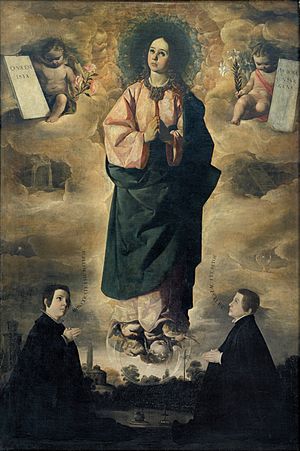Immaculate Conception (Zurbarán) facts for kids
Quick facts for kids Immaculate Conception |
|
|---|---|
 |
|
| Artist | Zurbarán |
| Year | 1632 |
| Location | Museu Nacional d'Art de Catalunya, Barcelona, Spain |
The Immaculate Conception is a famous painting created by the Spanish artist Francisco de Zurbarán in 1632. You can see this beautiful artwork at the National Art Museum of Catalonia in Barcelona, Spain.
What the Painting Shows
This painting shows Mary, the mother of Jesus, in a special way. It represents the idea that Mary was born completely free of original sin. This is a very old belief in the Catholic Church. Many artists during the Spanish Golden Age painted this theme.
Mary's Appearance
In the painting, Mary stands on a half-moon. Five small angels, called cherubim, are around her feet. She wears a necklace with the letters "A" and "M" linked together. These letters stand for "Ave Maria," which means "Hail Mary."
Around Mary's head, there's a bright glow. Many stars and more angels appear from the clouds in this halo.
Symbols in the Artwork
On each side of Mary, there are angels holding lilies and roses. These flowers are symbols of purity and innocence. There are also tablets with words from an old book called the 'Song of Songs'.
At the edges of the painting, you can see two students or scholars. There are also several symbols that represent Mary:
- The Unblemished Mirror, which means she was perfect.
- Jacob's Ladder, a symbol of a connection between heaven and earth.
- The Gates of Heaven, showing her role in leading people to God.
- The Morning Star, a sign of hope and guidance.
Zurbarán painted this theme several times. However, this particular version is considered one of his best works.
See also
 In Spanish: Inmaculada (Zurbarán, Barcelona) para niños
In Spanish: Inmaculada (Zurbarán, Barcelona) para niños

